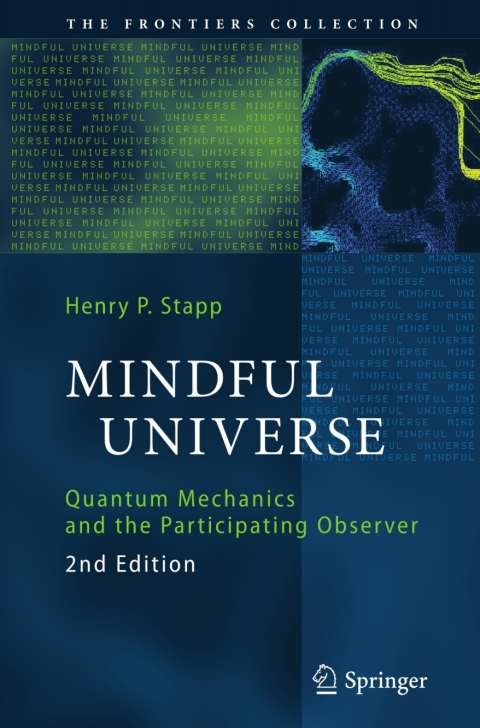

Most ebook files are in PDF format, so you can easily read them using various software such as Foxit Reader or directly on the Google Chrome browser.
Some ebook files are released by publishers in other formats such as .awz, .mobi, .epub, .fb2, etc. You may need to install specific software to read these formats on mobile/PC, such as Calibre.
Please read the tutorial at this link: https://ebookbell.com/faq
We offer FREE conversion to the popular formats you request; however, this may take some time. Therefore, right after payment, please email us, and we will try to provide the service as quickly as possible.
For some exceptional file formats or broken links (if any), please refrain from opening any disputes. Instead, email us first, and we will try to assist within a maximum of 6 hours.
EbookBell Team

4.7
86 reviews
ISBN 10: 3642180752
ISBN 13: 9783642180750
Author: Henry P Stapp
The classical mechanistic idea of nature that prevailed in science during the eighteenth and nineteenth centuries was an essentially mindless conception: the physically described aspects of nature were asserted to be completely determined by prior physically described aspects alone, with our conscious experiences entering only passively. During the twentieth century the classical concepts were found to be inadequate. In the new theory, quantum mechanics, our conscious experiences enter into the dynamics in specified ways not fixed by the physically described aspects alone. Consequences of this radical change in our understanding of the connection between mind and brain are described. This second edition contains two new chapters investigating the role of quantum phenomena in the problem of free will and in the placebo effect.
1 Science, Consciousness and Human Values
2 Human Knowledge as the Foundation of Science
3 Actions, Knowledge, and Information
3.1 The Anti-Newtonian Revolution
3.2 The World of Actions
3.3 Intentional Actions and Experienced Feedbacks
3.4 Cloudlike Forms
3.5 Simple Harmonic Oscillators
3.6 The Double-Slit Experiment
4 Nerve Terminals and the Need to Use Quantum Theory
4.1 Nerve Terminals
5 Templates for Action
6 The Physical Effectiveness of Conscious Will and the Quantum Zeno Effect
6.1 The Quantum Zeno Effect
6.2 William James's Theory of Volition
7 Support from Contemporary Psychology
8 Application to Neuropsychology
9 Roger Penrose's Theory and Quantum Decoherence
10 Non-Orthodox Versions of Quantum Theory and the Need for Process 1
10.1 The Many-Worlds (or Many-Minds) Approach and Decoherence
10.2 Bohm's Pilot-Wave Model
10.3 Spontaneous-Reduction Models
11 The Basis Problem in Many-Worlds Theories
11.1 Connection Between Classical Physics and Quantum Physics
11.2 Decoherence and Discreteness in Many-Minds/Worlds Theories
12 Despised Dualism
12.1 Historical Background
12.2 A Flawed Argument
12.3 Squaring with Contemporary Neuroscience
13 Whiteheadian Quantum Ontology
13.1 Some Key Elements of Whitehead's Process Ontology
13.2 From von Neumann NRQT to Tomonaga--Schwinger RQFT
13.3 Similarities Between Whitehead's Ontology and Ontologically Construed RQFT
13.4 The Transition from `Potentiality' to `Actuality' in Quantum Mechanics
13.5 Compatibility with Einstein's (Special) Theory of Relativity
13.6 The Psychophysical Building Blocks of Reality
14 Interview
15 Consciousness and the Anthropic Questions
16 Impact of Quantum Mechanics on Human Values
17 Placebo: A Clinically Significant Quantum Effect
17.1 Introduction
17.2 The Quantum Zeno Effect
17.3 Application to Placebos
18 Science-Based Discussion of Free Will
18.1 Physical Versus Mental
18.2 Classical Mechanics Versus Quantum Mechanics
18.3 The Need for a Radical Change
18.4 The Fine Structure of the Quantum Jumps: The Two Choices
18.5 Comparison of the Nature of the Mind--Matter Connection in Classical and Quantum Mechanics
18.6 The Universe Prior to Emergence of Life
18.7 Summarya
mindful universe quantum mechanics and the participating observer
mindful universe quantum mechanics and the participating observer pdf
what did einstein say about quantum physics
einstein vs quantum mechanics
quantum physics other dimensions
Tags: Henry P Stapp, Mindful, Universe